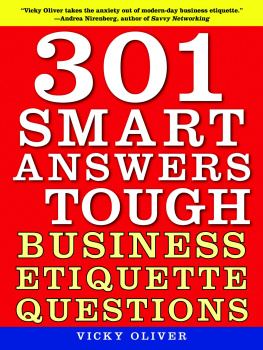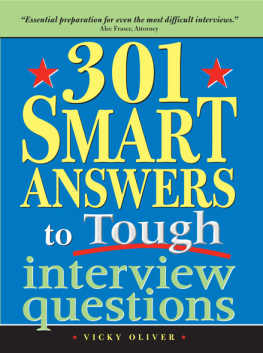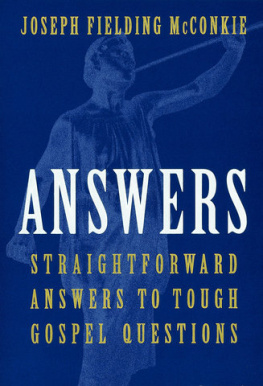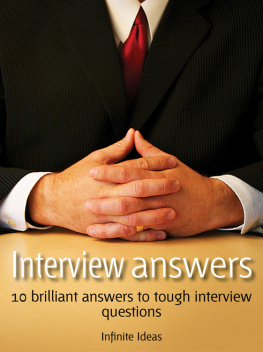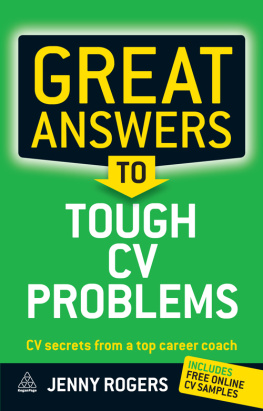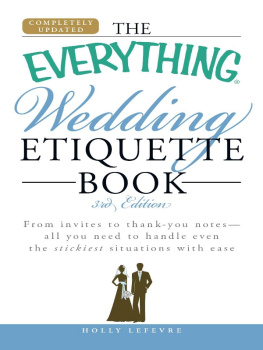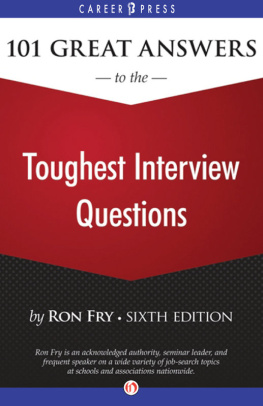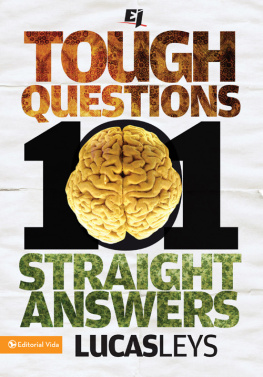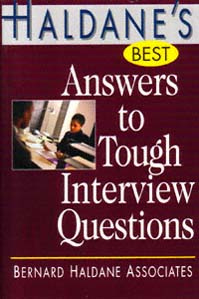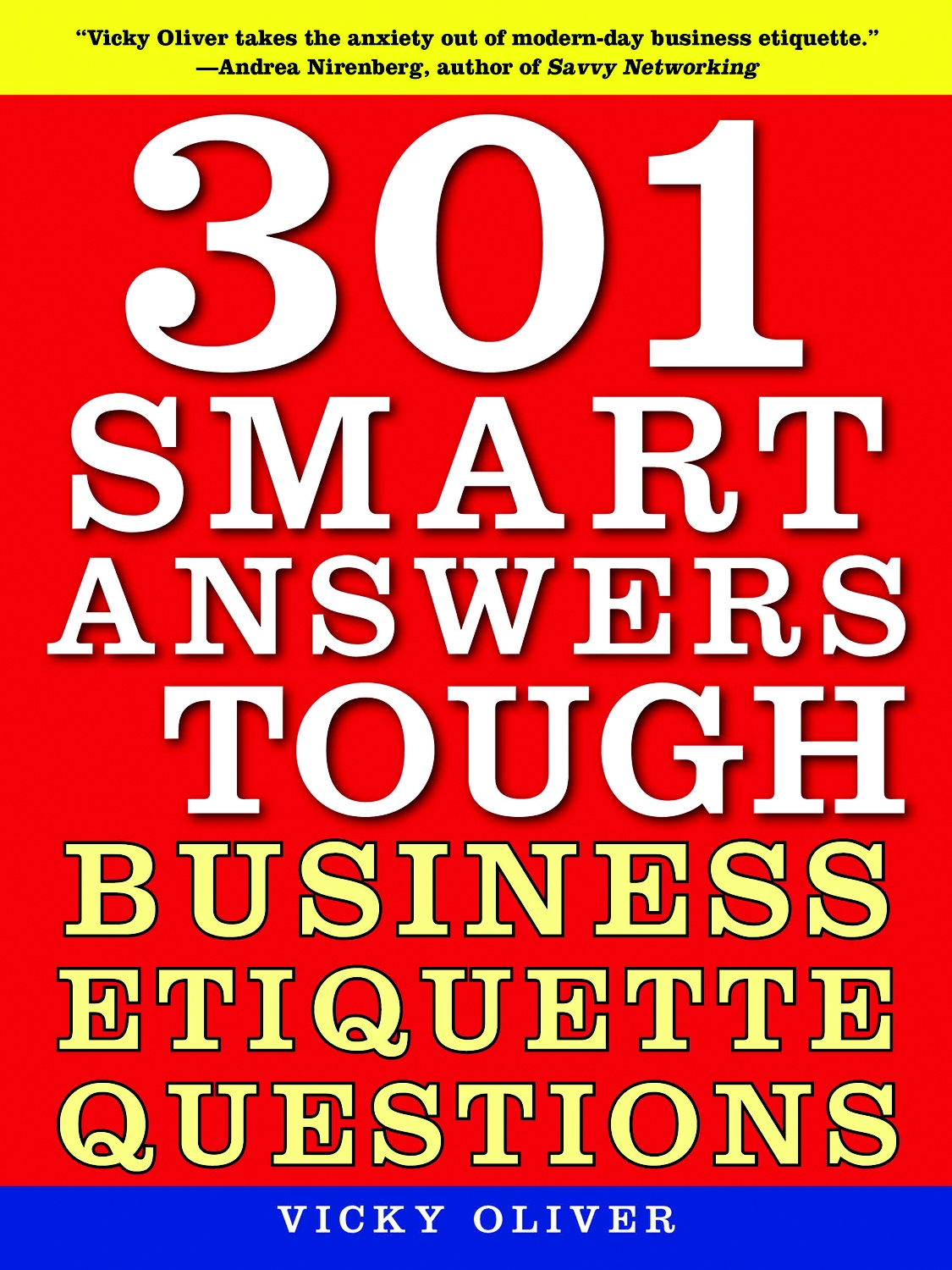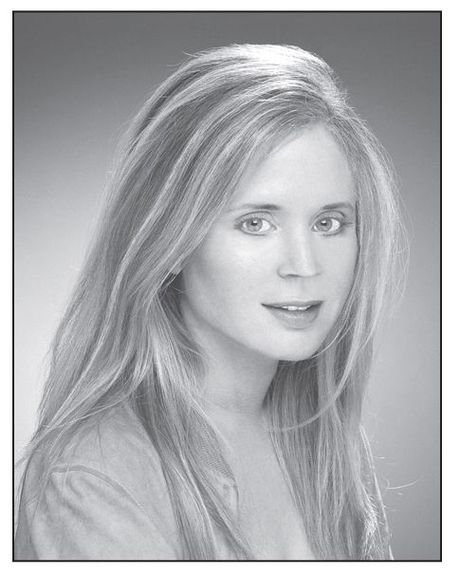About the Author
Vicky Olivers savvy career advice has been featured in over 300 media outlets, including The New York Times , The Wall Street Journal , the New York Post , LA Times , Chicago Tribune , Esquire magazine, Essence magazine, and Bloomberg TV.
Her first book, 301 Smart Answers to Tough Interview Questions , a national bestseller now in its third U.S. printing, won the 2010 Eric Hoffer award in the Business category. The book has been translated four times and is sold in twelve countries.
Her second book is called Power Sales Words: How to Write It, Say It, and Sell It with Sizzle. Her third book, titled Bad Bosses, Crazy Coworkers & Other Office Idiots , won the National Best Books 2009 Award for Best Business Careers Book and was a 2010 International Book Award finalist in the Business Careers category, a 2010 International Book Award winner in the Business Reference category, and won an Honorable Mention in the 2010 San Francisco Book Festival. Its now in its second printing.
She also gives seminars on job-hunting, networking, and business etiquette for groups of 50200.
Vicky Oliver is ever true to her schools. She is currently Chair of the Communications & Marketing Committee of the Brown University Alumni Association (BAA) Board of Governors, President Emeritus and an executive board member of the Brown University Club in New York, co-chair of the Career & Networking Committee of the Brown University Club in New York and its past Secretary, and Vice President of her class at Brown.
Vicky Oliver lives in Manhattan, where she helps people turn around their careers and their lives.
The 4 Cs of EtiquetteCourtesy, Consideration, Camaraderie, and Class
E mily Post once said, Manners are a sensitive awareness of the feelings of others. If you have that awareness, you have good manners, no matter what fork you use.
One way to retain that sensitivity is to consider etiquette as a system based on four key facets. The facets are easy to remember because each starts with the letter C, just like the 4 Cs of buying a diamond. The 4 Cs of proper etiquette are: courtesy, consideration, camaraderie, and class.
Courtesy involves listening over talking, not interrupting someone, not trumping someones story or stepping on his lines, being especially sensitive to the needs of the elderly, standing when someone enters a room or your workspace if possible, and using phrases such as Please, Thank you, and Pardon me.
Consideration acknowledges that there are many other people sharing a limited amount of space on planet. Whenever possible, you dont want to grate on their nerves. Consideration covers keeping your voice down, not cutting people off in lines or on highways, not making ones space untenable either by allowing loud noises into it or by keeping it so messy that its unbearable to work in.
Camaraderie means thinking of yourself as a team player and not always trying to angle to get ahead or promote your own achievements. Do your best not to keep a meticulous accounting of every favor you are ever owed, or you will feel miserable. Know that when you feel like you are part of a team, everyone will enjoy working with you, and that this benefit far outweighs the benefits of constant self-promotion and horn-tooting.
Class concerns your demeanor, which should aim for cordial rather than dour. It also involves tempering your sarcasm, especially if the humor is at someone elses expense. Be pleasant and do your best to please, even when others are unpleasant or direct their foul moods at you.
Etiquette is based on a system. Over time, the system will work for youif you can only get out of your own way long enough to allow it to.
Why Manners Still Matter in the 21st Century
I n 1624, John Donne wrote, No man is an island.
These words are as true today as they were almost four centuries ago. We depend on each other for survival. And nowhere is that more expressed than through our technology.
We can hide behind our computers, and then Facebook comes along and figures out a way to move the watercooler online. Suddenly we are all importing our contacts that weve known since childhoodand sharing them with passing acquaintances-of-acquaintancesuntil our networks mushroom exponentially into hundreds of people. We can resolve to never leave our cocoons and pods, and then foursquare invents a geolocator that rewards us for venturing out to different venues and sharing our own experiences with thousands of friends in our various networks.
We can determine that our real life is so challenging that wed prefer to live out our fantasies in the virtual world known as Second Life. But we create avatars in our own images that look exactly like ourselves. And then we import our businesses into Second Life and conduct meetings from our first life in Second Life!
There is no escape from other people!
In the United States we are a nation of three hundred million people, all of us colliding into each other in both our real and virtual lives at the speed of thought multiple times a day. Mannersfrom the most trivial, Excuse me, to the courtesy extended when you rise to give someone elderly your seat on the bus, to tamping down an email flame, to keeping your voice low and pleasant when you are in publicare simply a means for us to negotiate our way through the crowds that inhabit all of our worlds.
In meetings, we want to engage and persuade other people. Online, we want to connect with them. And over meals, mainly, we may want to engage, persuade, connect and entertain them. Above all, we dont want to offend them!
In her watershed book, Emily Post agreed with John Donne when she wrote, Every human beingunless dwelling alone in a caveis a member of society of one sort or another.
Modern etiquette simply spells out todays rules for negotiating these new, ever-expanding, ever-changing, and thoroughly intertwined societies.
Quiz Answers
1. B (See Chapter 1.)
2. D (See Chapter 3.)
3. B (See Chapter 1.)
4. A (See Chapter 2.)
5. D (See Chapter 5.)
6. A While answer 6D seems like the more considerate policy, it alerts your interviewer even earlier to the fact that youre running late. If shes the type to stew about small breaches, it gives her five more minutes to conclude that youre not the right person for the job. Its savvier to call the moment you were supposed to arrive, profusely apologize for your lateness, and tell her when she can expect you.
7. B (See Chapter 14.)
8. B (See Chapter 14.)
9. C (See Chapter 1.)
10. D (See Chapter 5.)
End Notes
For further reading, see Keith Ferrazzi with Tahl Raz, Never Eat Alone (New York, Random House, 2005), p.152-154.
USDOT Public Affairs press release, U.S. Transportation Secretary Ray LaHood Announces Federal Ban on Texting for Commercial Truck Drivers, February 26, 2010, http://www.dot.gov/affairs/2010/dot1410.htm (accessed March 14, 2010) and reprinted with permission from Justin Nisly at Justin.Nisly.ptt@dot.gov.
Susan Dunn, M.A., Two Good Reasons Not to Use Your Cell Phone in the Car, 2004, http://www.talewins.com/protectyourself/cellphones.htm (accessed March 14, 2010).
The University of Toronto study was also referenced in: http://www.dartmouthedu/~chance/course/Syllabi/97Dartmouth/day-1/phone-2.pdf. which is a pdf of the following article from The New York Times : Gina Kolata, First Proof, Driving While Talking on Phone is a Hazard, The New York Times, A-150 February 13 1997.

